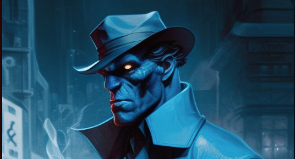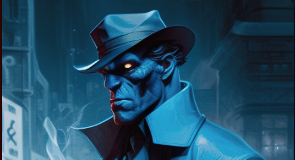Film Noir and Masculinity In Crisis
I’ve got ADHD and approach life a little sideways. This isn’t something I have a lot of control over. Sometimes, that’s a negative, sometimes it helps me see things that maybe not everyone else sees. I think this is why I really appreciate some of the marginalized genres that don’t get a lot of mainstream love.
I recently rewatched MOTHERLESS BROOKLYN by Ed Norton, and read the following in a review for the film:
“As a world-building exercise, noir has long offered a rich terrain for filmmakers to expand not just their stylistic skills, but to dig deep into the nooks and crannies of character, dialogue and ideology, with a particular focus in the latter on masculinity itself. Motherless Brooklyn is a love-letter to the long-held focus across film noir on MASCULINITY IN CRISIS (emphasis mine), but through Lethem’s source material and Norton’s deep engagement with it, something genuinely fresh explodes out of seemingly familiar material.”
I’m fascinated by this. As I’m editing my debut novel, THE BLUE GOLEM, I’m already thinking ahead to the sequel, THE BLACK SERPENT. In my WIP, Clay Golem isn’t a human man in Ahlendalay, but he thinks he used to be, and his struggles resonate with me (and, one hopes, with my readers) so this focus is interesting and worth thinking about going forward as I develop this series.
In the film, Lionel (played by Ed Norton) has Tourette’s Syndrome and is bit of a pariah in NYC because of his sudden verbal ejaculations. Similarly, Clay Golem is a pariah because golems are feared in Ahlendalay. Both avatars cannot control what they’re like, although Lionel can literally blunt some of the worst edges of his condition using marijuana or alcohol. (Clay has no such escape mechanisms at this point in his development.) In the film, a Black jazz trumpeter played by the late, great Michael K. Williams sees Lionel’s affliction and knows a fellow sufferer when he sees one.
In one scene, the MKW character (listed in the script simply as ‘Trumpet Man’) has rescued Lionel from an attacker (destroying his ‘best horn’ in the process) and he takes our hero back to his apartment where Lionel wakes up the following morning on the couch with a lump on his head.

There, the jazz musician offers Lionel a marijuana cigarette because he knows the smoke calms his Tourette’s symptoms. Trumpet Man explains that he suffers from something similar himself, and they have this exchange:
TRUMPET MAN
You play?LIONEL
Music? No.TRUMPET MAN
I’m not to keen on people being vocal while we playing,
but you were scatting on the line. I could hear it.LIONEL(Twitches bad)
On the line, Lionel! Lionel’s on the line! Shit.
I’m sorry about that. I have something wrong
with my head. The music really set it off. I’m sorry.TRUMPET MAN
Don’t be sorry. You got a head just like mine.
Always boiling over, turning things around.
That’s music… runs you more’n you run
it when it gets up in you. Some people call it
a gift but it’s a brain affliction just the same.LIONEL
Yeah, but I just twitch and shout. At least
you got a horn to push it through, make it
sound pretty.TRUMPET MAN
Yeah, but there’s a lotta other hours in
the day, you know what I’m sayin’?
So they have this nice moment between them where they understand each other, a Black jazz musician of some local repute, and a nobody P.I. with a broken brain whose condition masks his considerable abilities.
I see a lot of these things in Clay Golem. I see a lot of these things in myself.
This ‘masculinity in crisis’ thing is interesting. I wasn’t thinking about it when I first read the article in (the publication) about (the thing that serves as my sequel novel’s central problem), but it does lend an extra layer of interest to keep in mind as I try to get my arms around my novel’s non-negotiable central theme.
In the film, Lionel and Trumpet Man deal with their physical condition as well as the stigma of being outsiders in society. Where most Film Noir deals with questionable men and women in a fallen society, these men aren’t so much morally questionable as socially unacceptable, and they form an unexpected bond in their shared misery. I guess I don’t see their masculinity as being the crisis point as much as their humanity, outsiders in polite society.
I feel this keenly myself. What if you don’t fit in with everyone else through circumstances that are outside of your control? These are the things I’m musing on as I work through my writing right now for the golem detective novels.

